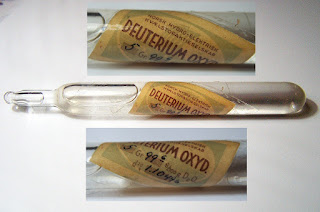What can you say has significantly changed modern world history that wouldn't be a massive overstatement? I mean
really changed it, drastically, the kind that shapes how the future will be. Cars, for sure. The internet, absolutely. Guns, definitely. Television, can't imagine a world without lunchtime
Price is Right in my childhood years. It's a small, prestigious club, and undoubtedly World War II brought a new one into membership; nuclear weapons. They're the cause of peace between the great powers ever since, as well as the greatest risk for man's self-destruction. Naturally, the first country to make them has undeniable mega-power, essentially providing them an I-Win button. And darn it if the Nazis weren't close to getting it first.
 |
Looking back on it, it seems like a positive
the Nazis didn't get their hands on one of these. |
Germany's push to nuclear weapons was centred in Norway at the Norsk Hydro plant. Here, they had the very important job of creating heavy water (think water post-Christmas dinner), a critical component for making nukes, because science says so. Of course, the plant would be a bit of a fortress itself due to how critical the production facility would be. Three massive, sheer cliffs lined the sides, leaving only one main entrance; a bridge under constant, vigilant surveillance; lights
everywhere, making a raid at nighttime no better; two hundred soldiers were garrisoned nearby to provide protection for the scientists. The British had tried to drop men in before simply for recon, but a crash landing made them easy targets and every member of the force was killed, some tortured first. Any frontal assault was out of the question save for bringing a small army. It was a monumental task, but one of the utmost importance.
Gubbins and co. got together a team of Norwegian supermen to do the deed. (It was usually better to get people from the country they were going to, as they felt a closer connection, knew the language, and so on.) Once again, the initial drop went poorly. Being Norway, they were plunged into terribly cold, brutal weather conditions and had to work their way to finding first each other and then shelter. Back home it was assumed that the men were dead, surely killed by the elements long before they even got to the Germans, but they managed to find their way to a cabin and laid low for four days until the storm passed.
 |
A picture of Norsk Hydro heavy water. It looks like water.
It smells like water. It might even be just water. But darn
it, scientists say there's a difference and that's really
bloody important for some reason. |
They managed to eventually find their way to Norsk Hydro a little worse for wear. Their plan was simple: there was one clear path to the plant that was heavily guarded and well lit, so they came up with the idea of
not taking that path. They decided instead to scale the cliffs, all the way down and all the way back up the other side (remember, these are Norwegian supermen), and sneak into the building. This way they wouldn't alert the garrison that, in all their two hundred men, decided it
wasn't a good idea to place a couple of guys on the other side to watch the cliffs. Managing to sneak in, they set off a few explosions on key pieces of equipment that were just small enough to take out some important machinery but not large enough to cause any real commotion. They were halfway up the return side of the gorge before the sirens began to go off. In spite of being armed to the nines, they didn't fire a single shot. It was a brilliantly thought out, precisely executed plan that with hindsight now might have been a completely world-changing moment. Any jokes that were passed around about the effectiveness of the new ministry were pretty well silenced by this point. After all, who is to say how the nuclear weapons program would have went had they not taken out a key component?
 |
I'm low on pictures for the blog this week,
so here's one of Churchill looking
kind of goofy in a helmet. When in doubt,
throw in a Churchill picture. |
Of course, back home you would think they'd be all smiles and sunshine at this successful run, but in reality it was much to the contrary the contrary. They were gearing up for another major movement seeing as the Nazis were losing the war at this point and the Allies were about to storm the mainland. Yes, they were still seeing successes left and right (Jeffries had just invented a new torpedo-like bomb that the Americans had used to take out over thirty German submarines, causing Churchill to give him the appropriate name of CD - Chief of Destruction) but they still had plenty more to go. They were soon to drop three-hundred men into France to "stir up resistance, harass enemy movements and tie down as many German divisions as possible." Their initial work was focussed on delaying transportation of weapons and other goods to the beaches of Operation Overlord - the invasion of Normandy. That meant blowing up bridges, taking out train-tracks, and other such delays. The work they did was more effective than what the air forces had done in two months, and cost a fraction of it in terms of manpower and finances.
Nevertheless, troops and goods were still going to get there. What can a few men do to delay a whole Nazi war machine?



No comments:
Post a Comment